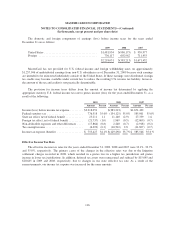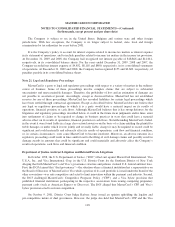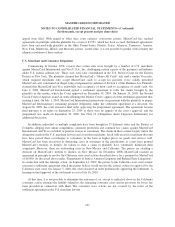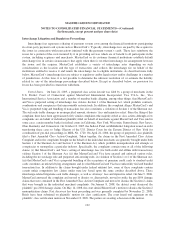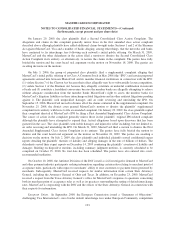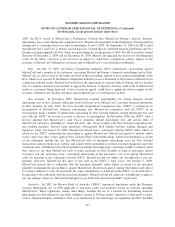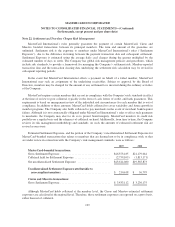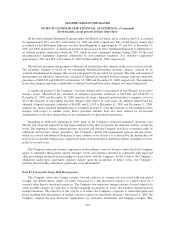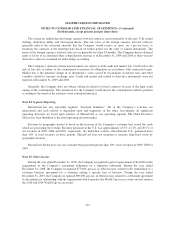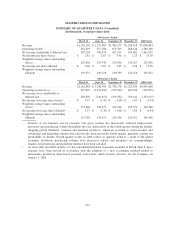MasterCard 2009 Annual Report Download - page 133
Download and view the complete annual report
Please find page 133 of the 2009 MasterCard annual report below. You can navigate through the pages in the report by either clicking on the pages listed below, or by using the keyword search tool below to find specific information within the annual report.MASTERCARD INCORPORATED
NOTES TO CONSOLIDATED FINANCIAL STATEMENTS—(Continued)
(In thousands, except percent and per share data)
On January 29, 2009, the class plaintiffs filed a Second Consolidated Class Action Complaint. The
allegations and claims in this complaint generally mirror those in the first amended class action complaint
described above although plaintiffs have added additional claims brought under Sections 1 and 2 of the Sherman
Act against MasterCard, Visa and a number of banks alleging, among other things, that the networks and banks
have continued to fix interchange fees following each network’s initial public offering. On March 31, 2009,
MasterCard and the other defendants in the action filed a motion to dismiss the Second Consolidated Class
Action Complaint in its entirety, or alternatively, to narrow the claims in the complaint. The parties have fully
briefed the motion and the court heard oral argument on the motion on November 18, 2009. The parties are
awaiting decisions on the motions.
On July 5, 2006, the group of purported class plaintiffs filed a supplemental complaint alleging that
MasterCard’s initial public offering of its Class A Common Stock in May 2006 (the “IPO”) and certain purported
agreements entered into between MasterCard and its member financial institutions in connection with the IPO:
(1) violate Section 7 of the Clayton Act because their effect allegedly may be to substantially lessen competition,
(2) violate Section 1 of the Sherman Act because they allegedly constitute an unlawful combination in restraint
of trade and (3) constitute a fraudulent conveyance because the member banks are allegedly attempting to release
without adequate consideration from the member banks MasterCard’s right to assess the member banks for
MasterCard’s litigation liabilities in these interchange-related litigations and in other antitrust litigations pending
against it. The plaintiffs seek unspecified damages and an order reversing and unwinding the IPO. On
September 15, 2006, MasterCard moved to dismiss all of the claims contained in the supplemental complaint. On
November 25, 2008, the district court granted MasterCard’s motion to dismiss the plaintiffs’ supplemental
complaint in its entirety with leave to file an amended complaint. On January 29, 2009, the class plaintiffs repled
their complaint directed at MasterCard’s IPO by filing a First Amended Supplemental Class Action Complaint.
The causes of action in the complaint generally mirror those in the plaintiffs’ original IPO-related complaint
although the plaintiffs have attempted to expand their factual allegations based upon discovery that has been
garnered in the case. The class plaintiffs seek treble damages and injunctive relief including, but not limited to,
an order reversing and unwinding the IPO. On March 31, 2009, MasterCard filed a motion to dismiss the First
Amended Supplemental Class Action Complaint in its entirety. The parties have fully briefed the motion to
dismiss and the court heard oral argument on the motion on November 18, 2009. The parties are awaiting a
decision on the motion. On July 2, 2009, the class plaintiffs and individual plaintiffs served confidential expert
reports detailing the plaintiffs’ theories of liability and alleging damages in the tens of billions of dollars. The
defendants served their expert reports on December 14, 2009 countering the plaintiffs’ assertions of liability and
damages. Briefing on dispositive motions, including summary judgment motions, is currently scheduled to be
completed on October 25, 2010. No trial date has been scheduled. The parties have also entered into court-
recommended mediation.
On October 10, 2008, the Antitrust Division of the DOJ issued a civil investigative demand to MasterCard
and other payment industry participants seeking information regarding certain rules relating to merchant point of
acceptance rules, particularly with respect to merchants’ ability to steer customers to payment forms preferred by
merchants. Subsequently, MasterCard received requests for similar information from certain State Attorneys
General, including the Attorneys General of Ohio and Texas. In addition, on December 23, 2009, MasterCard
received a request from the Texas Attorney General’s office for MasterCard’s responses to questions concerning
both its merchant point of acceptance rules as well as its practices surrounding the setting of default interchange
rates. MasterCard is cooperating with the DOJ and the offices of the State Attorneys General in connection with
their requests for information.
European Union. In September 2000, the European Commission issued a “Statement of Objections”
challenging Visa International’s cross-border default interchange fees under European Community competition
123





